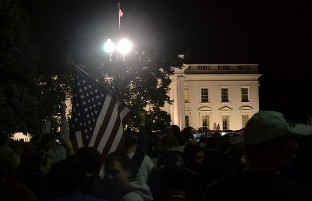Fear and relief

As I listened
to President Obama's calmly triumphant announcement that Osama bin Laden had been killed and
"justice has been served"--and to the reports of celebrations in American
streets--I tried to sort out my own responses to the surprising news.
Throughout the morning, my inbox filled with e-mails from friends near and far.
These reactions, unlike those of the U.S. government and most Americans, were
more ambivalent.
A friend at Yale reminded
me of Proverbs 24:17, Ezekiel 33:11 and Matthew 5:44, adding this:
After
9/11 I found it very hard to bring myself to pray for Usama bin Laden. But by
God's grace I did because Jesus said I must. And though I am tempted to rejoice
today, I will not because Jesus said I must not.
A young Christian leader
from the Middle East offered a view forged in a majority-Muslim country:
A
huge opportunity now--after the death of bin Laden--is for Americans to
intentionally free themselves fully from the domain of fear and those who
manipulate it for their own agendas. Politicians will be looking for the next
"enemy" to continue to distract you from being truly the "land of the
free." You are not free until you eliminate all your fear. Love drives out
fear.
A church leader and
scholar from the U.K. wrote this:
Multiple
ironies. How is God's justice advanced by foreign troops acting as vigilantes
in someone else's sovereign territory? Whose justice? Which rationality? All my
instincts were, and are, to sigh with relief; even, in a measure, to celebrate.
But my mind warns that this is a dangerous precedent in principle and an
extremely dangerous action in terms of possible unintended consequences.
My friends' responses and
my own memories of the horror of 9/11 and its aftermath nudged me to the
following considerations:
- Osama bin Laden was the most infamous voice of
hatred and the most dangerous purveyor of terror in today's world. Clearly, a
significant measure of good has been achieved in that an evildoer of such
magnitude is no longer scheming about how to harm and kill innocent people--as
well as seriously disrupt the lives of just about all of us (airport
scanners!).
- For the followers of Jesus Christ, no one's death
is a cause for rejoicing. This applies to Osama bin Laden no less than to any
other evildoer, large or small. Jesus Christ died for all; there are no
irredeemable people. The path of repentance is open to anyone willing to walk
on it, and no human being has the right to permanently close that path for
anyone.
- We are right to feel a sense of relief that a major
source of evil has been removed. But we should reflect also on the flip side of
that relief: the nature of our fears. As the King hearings and state-level anti-Sharia bills indicate, many people in our nation find
themselves under a spell of a "green scare" analogous to the red scare of the
1950s. But fear is a foolish counselor, and our war in Iraq--unnecessary,
unjust and counterproductive--is evidence of this.
- Osama bin Laden was killed through an action that
instantiates American exceptionalism. We will never consent to grant other
nations (China, as an emerging superpower?) the right to intervene in other
sovereign states the way we just intervened in Pakistan. As believers in the
one God, Christians are universalists. We should not ourselves exercise rights
we are unwilling to grant to others. This basic principle of morality should
apply to international relations as well.
The death of Osama bin
Laden has not left Muslim terrorists in utter defeat, but it has significantly
weakened them. They are losing ground in other ways as well. As the Arab Spring
from Tunisia to Yemen indicates, among Muslim communities--especially the
urbane young--democratic revolution is more attractive than the terrorist
solution. The doors are open to pursue anti-extremism strategies more in line
with the Christian faith than the "war on terror" has been. By doing this we
can build on fundamental values that unite Muslims with many Christian (as well
as Jewish and humanist) citizens of Western nations.




